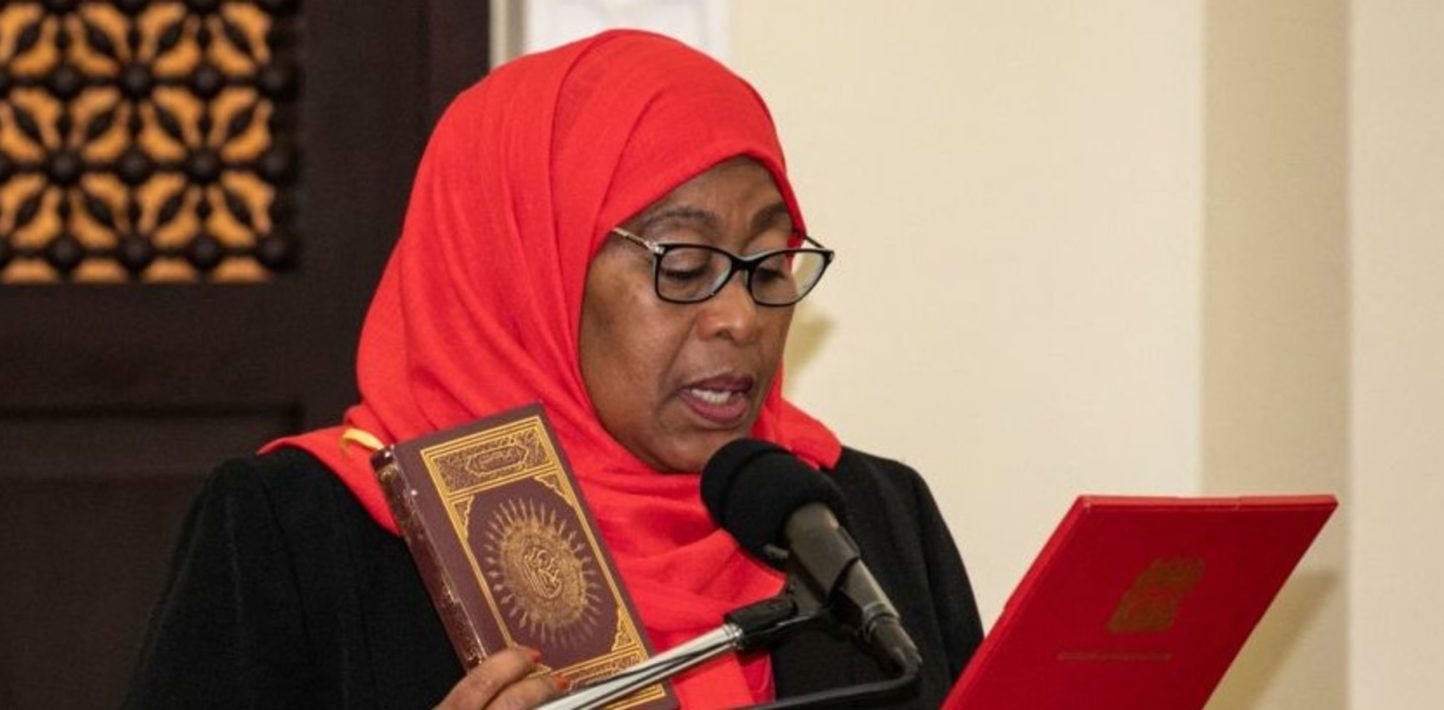On 6 April 2021, in a welcome move, Tanzania’s new president Samia Suluhu announced plans to set up a national COVID-19 taskforce to inform a new state response to the pandemic.
Using national-level data and guidance from world health authorities, the taskforce will, among other things, advise the government on public health measures and how to communicate them to the public.
The move, which marks an apparent about-turn in the country’s approach to COVID-19, is the first time Samia Suluhu’s new administration has spoken publicly about new measures on the pandemic since she was sworn-in as Tanzanian president on 19 March 2021, following the death of her predecessor John Pombe Magufuli.
It is well documented that the previous administration did not implement practical measures to protect the public from the pandemic. On 29 April 2020, Tanzania stopped publishing information on COVID-19 infection rates and related deaths. At the time of writing, official figures remain as they were in 2020 – 509 confirmed infections and 39 deaths – a minuscule figure compared to its neighbours and other countries around the world.
The late president had publicly dismissed COVID-19 vaccines saying that “they are useless and dangerous.” He further urged Tanzanians to trust in God and use alternative remedies such as inhaling steam, and later declared Tanzania “coronavirus-free”, without providing any proof.
The previous government’s denialist stance did not, however, prevent the devastating effects of the disease in the country. Unsurprisingly, many deaths over recent months, including various prominent individuals, are thought to have been caused by COVID-19, although official accounts attributed them to causes such as “breathing difficulties” and “viral pneumonia” according to the Tanzania Episcopal Conference (TEC). In February 2021 alone, 10 prominent government figures died, including Zanzibar’s First Vice President, Seif Sharif Hamad, after he had tested positive for COVID-19 a few weeks earlier.
President Suluhu must act now to save lives from this deadly virus. She must look hard at past failures and chart a way forward that rests on accepting science and debunking myths
In February and March 2021 religious leaders including Fr. Charles Kitima, the General Secretary of TEC, through Council of Bishops of the Catholic Church in Tanzania, reported a surge in the number of deaths, and that priests, nuns and nurses had died from “breathing difficulties.” Despite this, there was no change in the government’s response to a pandemic that has so far killed over 2.8 million people worldwide and infected more than 128 million.
Even following President Suluhu’s inauguration, the use of facemasks, social distancing, and other prevention measures have remained largely absent throughout Tanzania. Demonstrating a continued disregard for COVID-19 preventive measures, government officials, including the president herself, still appear in crowded public spaces without facemasks.
Despite this, the president’s announcement of the national COVID-19 taskforce is a highly welcome step in the right direction. However, to ensure that it is not merely an exercise in public and international relations, the taskforce must take decisive action in a number of areas.
Firstly, it must ensure that international human rights standards are at the centre of all responses to COVID-19, in order to best protect public health and support all people in Tanzania, including those who are most at risk from the disease as well as those who are likely to face barriers in protecting themselves from the virus including for socio-economic reasons.
Under international law, Tanzania’s government is obligated to ensure everyone has the right to enjoy the best attainable standard of physical and mental health, and the right to enjoy the benefits of scientific progress. This is explicitly expressed in a number of international human rights instruments including the International Covenant on Economic, Social and Cultural Rights and by the African Charter on Human and People’s Rights to all of which Tanzania is a signatory. The right to health is also supported by Article 30(2)(b) of the Constitution of the United Republic of Tanzania.
Access to health-related information is also a crucial part of the right to health. Providing “education and access to information concerning the main health problems in the community, including methods of preventing and controlling them” is considered an “obligation of comparable priority” to the core obligations of the right to health. Information accessibility is a key dimension of the accessibility of health care, and includes the right to “seek, receive and impart information and ideas concerning health issues”.
The taskforce must therefore also recommend that repressive laws that were used to restrict various forms of communication, including media coverage of the government’s handling of the COVID-19 pandemic are repealed. In one particularly brazen example at the start of April, several media companies were each fined five million Tanzania shillings (approximately 2,150 US dollars) and ordered to apologize for “transmission of false and misleading information” on the country’s approach to managing COVID-19.The state should instead facilitate universal access to information, preventive care, medication, treatment, and vaccines.
The formation of the taskforce is also an opportunity for the Tanzanian authorities to embrace vaccination as part of their COVID-19 strategy, and ensure transparency, participation, accountability, equality, and non-discrimination in access to vaccines.
President Suluhu must act now to save lives from this deadly virus. She must look hard at past failures and chart a way forward that rests on accepting science and debunking myths, improving access to health care to those in need, and starting vaccinations to reduce new infections. She must give greater priority to the right to health by ensuring her government treats COVID-19 as the serious emergency it is.
This article was first published in The East African’s print edition on 18 April


